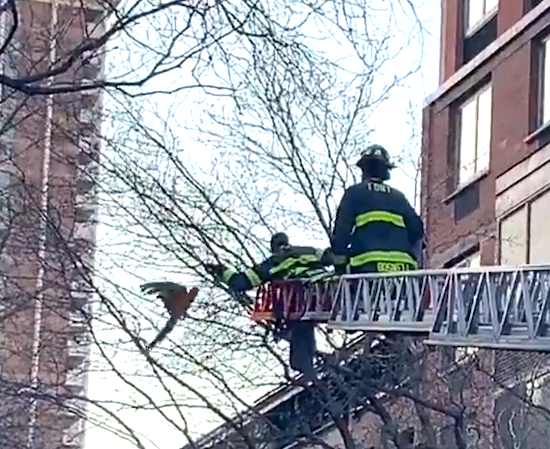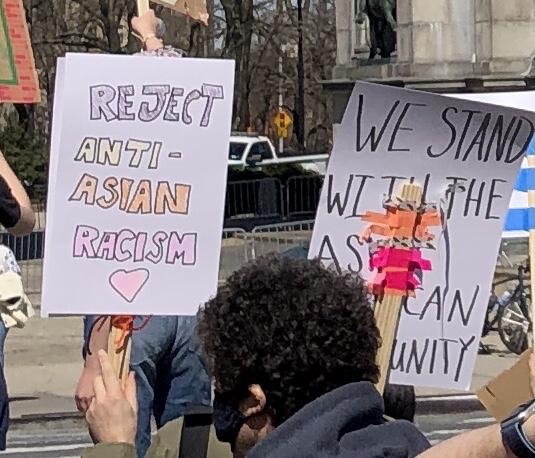By Michael McDowell
Maya Wiley served in the de Blasio administration, including as Counsel to the Mayor, but she’s distanced herself from de Blasio in her own run for mayor. Wiley says her unique background, both as an activist and as a top government official who got things done, sets her apart from the other Democrats running.
Wiley led the Civilian Complaint Review Board and the Minority and Women-Owned Business Enterprises (M/WBEs) under de Blasio, and has worked at the NAACP Legal Defense & Educational Fund, the American Civil Liberties Union, and the U.S. Attorney’s Office for the Southern District of New York. She recently spoke with the Rag.
The following conversation with Wiley has been condensed and edited.
WSR: Tell us a little bit about yourself. What has prepared you to run New York City?
MW: I am not a politician. I am an advocate and an activist who has spent 30 years working on creating more opportunities for people. I’m the only candidate that has [worked] in the Mayor’s Senior Cabinet in City Hall; I’ve run the New York City Civilian Complaint Review Board; and I’ve worked in an advisory capacity on other major issues facing the city, such as school diversity and technology. So I am actually the candidate that has made change for decades.
When I created a budget line for broadband in the capital construction budget, found the revenue, created the arguments, and got the revenue committed, we did things like get every single apartment in Queensbridge Houses free broadband, which was something the government had never thought to do before, didn’t know how to do, [and] I will admit that I didn’t [know how to do it] either, because part of being a really effective manager in city government is understanding that you have to help government do things it hasn’t done before, which also includes things you haven’t done before. Finding the pathways to get it done, pulling government agencies together, as well as partnering with people outside of government—everyone from experts to community-based leaders—is what I’ve done my whole career.
WSR: A question related to your work with the Civilian Complaint Review Board. The Police Benevolent Association: its contract expired, I believe, in July 2017, and the issue hasn’t yet been settled. As Mayor, does contract negotiation present an opportunity for direct and substantive policy change at the NYPD, and if so, what would you push for?
MW: The important thing to understand is how much a New York City Mayor and a Mayor Maya Wiley will do that is transformative policing, that has nothing to do with the contract. I think that’s important to say, because one of the things that’s been unfortunate about these years with the de Blasio Administration is that there was much more we could have done even in the absence of that contract. That includes what I call putting the public back in public safety, meaning having civilian oversight and direction on the rules of the road for policing: what is okay and what is not okay, and also what the focus of policing should be. In other words, what are appropriate police functions and what are not appropriate police functions, such as mental illness crisis response, where what we really need is to have the right folks with the right skill sets and training and experience responding to those kinds of crises.
Now, obviously, it is important for all workers—and I include police officers in this category of all workers—to have the ability to come together and argue for a fair and safe and just workplace. That includes New York City’s police officers. I believe in unions, and I believe in collective bargaining. I certainly will be in conversations about this [contract]. But a lot of these changes don’t have anything to do with the union contract, because they’re not about the rules of the road. They’re not about the priorities of policing. That gets set by the elected leadership of city government, and by the Mayor in particular.
WSR: In 2020, New York City recorded 447 homicides, the most since 2011. As Mayor, how do you address this?
MW: We have a gun violence prevention plan. It has been based on everything from talking to experts, to talking to people who’ve been impacted in communities, to looking at what works. We need to make it easier to get a job than a gun. That means a couple of different things. We’re going to double summer youth employment, we are going to put trauma-informed care in our schools, and we’re going to create what we call safe corridors for kids going to and from school, where things can sometimes happen. We’re also going to create a participatory justice fund. We’re going to take $18 million from the New York City Police budget, and we’re going to put it in a participatory justice fund, just like participatory budgeting, so communities can direct the resources in ways that are responsive to their needs, in terms of gun violence prevention and resolution. Communities have firsthand knowledge on the kinds of things that are creating the problem, and should have the opportunity to say what the solutions are and have some resources to solve it.
WSR: You spoke at the Lucerne. How does the city meet its obligations to people who are experiencing homelessness—such as the legal right to shelter—while addressing the concerns of all stakeholders, including people who might oppose shelters in their neighborhoods?
MW: I think it starts with conversation and partnership. One of the things that the city government can and must do much better is engage residents and those impacted by the problems that the city is trying to solve in conversation.
It is absolutely fair and right [if] a community says I’m scared, I’m worried, this is going to reduce my quality of life or make me less safe or make my children less safe. That’s a legitimate concern that the city has to listen to. If we’re having those conversations, we’re able to ensure that programs are working and that they’re effective.
I think we also cut through a lot of this when we start talking about taking people not from the streets to shelter, but from the streets to housing. The Lucerne was a really great example of this—not what happened in the beginning—but what ultimately got created was on-premises support services in housing that is more like having your own apartment in the sense that you have your own door, your own private space, and your own bathroom. That actually has very good results in terms of what’s happening for the men who are getting those services on site. That’s what supportive housing is. We have to go to a Housing First strategy, but it absolutely can and must include engagement with the community.
WSR: Thinking about housing: a New York City Housing Authority (NYCHA) question. Some NYCHA developments are currently undergoing Rental Assistance Demonstration (RAD) conversion. In RAD, a federal program through which housing agencies are able to obtain much-needed capital to repair and renovate decaying developments, management of developments is privatized, and the program has been viewed with optimism by some and skepticism by others. So far, RAD tenants appear to be more susceptible to eviction than traditional NYCHA tenants, even though RAD tenants are supposedly covered by the same protections as NYCHA tenants. Are you for or against RAD?
MW: I’m for keeping public housing public, and there are a lot of real concerns about what RAD does to that, so I’m not supporting RAD at this time. The truth is that our homeless crisis is an eviction crisis. It’s a crisis of affordability and people not being able to afford their homes. We definitely have to make sure that we’re renovating and rehabilitating NYCHA and making it safer.
I’ve got a New Deal New York plan that puts $10 billion in—creating 100,000 jobs—to help us recover the economy, and do it in a way that helps people support themselves and their families. That includes $2 billion earmarked specifically for NYCHA renovation and rehabilitation. That’s part of putting public skin in the game on making sure that happens. I’m also going to go to D.C. and talk to D.C. about its obligations to what is federal housing, what was created out of a federal program that the federal government has been disinvesting in.
We’re going to talk with residents and create a governance structure for residents, really giving them a voice based on transparency and a clear-eyed view of what the financial issues are, where the money has been going, and what the various options are.
WSR: The Upper West Side is home to some of New York’s poorest New Yorkers, and some of its wealthiest. As mayor, how will you induce wealthy New Yorkers who may have left town to come back to the city?
MW: This is something I feel really positively about. We’re one city, and one of the things that makes us a strong city is that we’ve got everybody here—800 languages, 40 percent of our population born in a different country—we’ve got everyone from folks with big bank accounts, to folks with no bank accounts at all. The question is making the city work for all of us. One of the things that has always been true about New York City is wealthy people don’t live here because it’s cheap. That’s not why they live here, and one of the things I’ve heard repeatedly from a lot of wealthy people I’ve engaged with—not all, but a lot—is, “Look, Maya: I will pay more. I can afford to pay more. I already do pay more—it was always cheaper to live in Florida! And I still chose New York because I love New York. I love the theater, I love the restaurants, I love the diversity.”
And then what they say is, “My question is, what are you going to do with the money? How are you going to assure me that it’s going to be well spent? Because if I feel confidence in that, I feel more confidence paying more in taxes.” I think that’s fair. That’s called governance. It’s the responsibility of a Mayor to lay out exactly what the vision is, and how it gets accomplished.
I pay a lot of attention in my proposals that [these] are things that are within my power as Mayor, that I can start doing on day one, which don’t require agreement from Albany or dollars from D.C., not because I won’t work for that, but because I want to be very clear about what I can do for New Yorkers and the commitments I can make and keep.
The other thing I’ll say, because I am a wonk, is there’s research that shows that wealthy people actually often select more expensive places to live. The data shows that, generally speaking, wealthy people don’t leave a city because taxes increase: it really is about the sense of hope, about possibility, and about quality of life. So we have to keep insuring and investing in that.
WSR: What does quality of life mean to you?
MW: Quality of life to me really means the ability to enjoy my neighborhood and my city, and that enjoyment starts with knowing that I can be here, and that all my neighbors can be here. I live in a diverse neighborhood, and that’s what I love about it. I want to know that all my neighbors can be here, and will be able to stay here. That includes our small businesses, the neighborhood restaurants, coffee shops, cafes, and little art spots. The places in which we can enjoy being a neighborhood.
And I can get around this city, for the most part. We have some transportation deserts that we have to pay attention to, but we have the most fantastic transportation system compared to most other cities, where you really can’t access most of the city on public transportation, and I love that about the city.
WSR: Are you a public school parent or a private school parent, and can you talk about that decision?
MW: I’ve been both. Both of my kids have been in public school, I navigated the elementary school, middle school, and high school process in the public system as a parent, and my two kids collectively have 15 years of public school. I add them together.
My older daughter is in college now, and my 11th grader is in private school now. A big part of that decision was hers, to move to private school, because she wanted more art education, she didn’t want to specialize, and she wanted smaller class sizes. We could meet some of those in the public system, but it’s very difficult to meet all of them. So we met her demand to give her what she was asking for.
More information about Maya Wiley may be found here. Conversations with mayoral hopefuls will be published on a regular basis until the June primary. More information about how to vote is here.
Primary Day is on June 22nd. It will be the first citywide election to utilize ranked choice voting.










I have been following Maya Wiley for awhile…based on her reputation; quick wit; and dogged pursuit of fairness and inclusion of all. She knows her way around city hall based on her experience, and I have found her to be very straight forward. AND NO…I am not her manager, her mother, or a paid endorsement. I am just someone tired of both white or black or whatever MALES running the city. She is the absolute best choice, actually even if she were not a woman. ..but Go Maya!!
This is a joke, right?
I am definitely committed to voting for Maya. I have also been following her all the years she has been on MSNBC and think she is absolutely qualified. She will make a great Mayor, I think it’s time for a women Mayor, period. She is really impressive in a large field.
Why do we need a woman mayor? Let’s have the best candidate for the job, regardless of race, gender, religion, etc. Remember what Dr. King said – content of their character rather than the color of their skin?
I am tired of so much of this election being focused on candidate’s identities. NYC is at a major inflection point. There are dozens of candidates. Let’s save the ink for their policy positions, not what boxes they check. I appreciate that WSR is trying to do this. I wish commenters and the NY Times would do the same.
reply to Leon:
I wasn’t aware that women have different skin colors than men.
In general, Leon is right that policy and competence are the most defining in making a decision. Maya Wiley is deep into policy — some call her a wonk — and she has the experience and competence. She is running on her policies.
However, haven’t we noticed the current #MeToo scandal in Albany? Whatever the final result, it is obvious there was a culture of male chauvinism that permeated the Governor’s office, and in fact a macho culture that was dominant at the highest levels of state government. This sort of culture is damaging for results.
While NYC government has been much better, maybe a competent woman at the top would make a big difference.
Maya Wiley has grown on me consistently in the campaign, due to both her policies and her calm and humorous manner. I hope people give her a serious look.
Your patronizing comment “I wasn’t aware that women have different skin colors than men,” is an attempt to be witty but actually shows ignorance and lack of education. Though Dr. King’s efforts and speech were primarily focused on race relations, he was thoughtful enough to know that his words could be applied to similar situations – he was saying “don’t judge a book by its cover.” Most people can extrapolate this to other circumstances and don’t need it spoon fed to them.
Isn’t that similar to what liberals espouse when it comes to how the Supreme Court should decide cases? They would like the Constitution to be a living document that adapts.
reply to Leon:
Sure, my comment was mildly snarky… but nothing like your level of personal attack: “ignorance and lack of education.” That seems pretty uncivil.
The fact is that the King quote you cite is wildly misused, usually by people who are not too happy about the things King stood for. In his day, King supported Affirmative Action and other special compensatory programs. And he thought leadership by Blacks and other minorities was crucial. he was against discrimination: he wasn’t “color blind.”
https://swap.stanford.edu/20141218230000/https://mlk-kpp01.stanford.edu/kingweb/additional_resources/articles/mercury.htm
While policy and viewpoint is key, Leon didn’t attempt to dispute the argument that having a woman Mayor could indeed make a difference. It has to do with life experiences. It is far less likely that a woman Mayor would put up with the sort of culture we see in Albany. or that a Black Mayor would put up with the current level of school segregation. Or that a Black Mayor would have put up with the level of racism in policing that we saw under Bloomberg (a decade of racial profiling) and Giuliani (umpteen cases of brutality and shootings with never any repercussions).
My mother and her friends used to gab about how much they liked certain politicians based on their smiles. And then vote for them. In this case, I might follow their lead.
All we need is another activist to run the city 1970s here we come. I think we would be better off with IBM Watson running the city.
reply to John:
just wondering, who were the previous “activists” who rose to Mayor?
Bruce,
Her main point is she will raise tax’s and redistribute the wealth. That will not help me and my family as we are upper middle class but get hit like we are the wealthy folks and we make to much to benefit from the redistribution.
You don’t think people who make $500K or even a million a year could afford to pay a higher marginal rate? If you’re making 500K a year, you’re not “upper middle class”, even in NYC. You’re rich.
Sorry, but there is no reasonable world in which a Manhattan homeowner, earning a half-million salary, with two children in private school, could ever be considered “lower-middle class.”
I’m not even going to touch your other premises, like the bit about NYC public schools being “Third World” caliber.
This has to be one of the more delusional comments I’ve ever read on this site.
Bruce an average 2 bedroom apartment is north of 1.5 million in the city. Also you have to send children to private school as public education here is 3rd world, so 150K a year for 2 children. After current tax’s on 500K you take home about 300K which is gone on school, housing and food. This income to expense ratio would be considered lower middle class in most other states.
If you’re upper-middle class, why are you upset about missing out on all this supposed wealth “redistribution”? By your own admission, you don’t need it.
The Current mayor
Activist will only benefit a small portion of the population leaving the rest in ruin.
DeBlasio wasn’t an “activist”. He was a longtime city and federal govt official and was an elected City Councilperson and Public Advocate for 8 years.
If you want someone who was an “activist” in early life, maybe look at Obama, who spent years as a community organizer before going to law school.
Is this what this once great city has come to?
“I think it starts with conversation and partnership. One of the things that the city government can and must do much better is engage residents and those impacted by the problems that the city is trying to solve in conversation.”
That’s what she says, but in reality that’s not what she does. Wiley headed the SDAG report whose big “recommendation” was to end G&T programs, while there was no dedicated representative of a G&T program on the committee. Then, when the report received significant pushback from parents and politicians, she became defensive and patronizing. Then, she left for tv commentating leaving the mess she created behind her. No, she should not become Mayor.
She’s all in favor of public school diversity just as long as she sends her daughter to a private school.
Another wealthy “progressive” hypocrite. No thanks.
I am a fairly intelligent person and I cannot follow any of her answers – they are so wordy and confusing. Underneath all the verbiage, it seems like she’s saying she’s been a success at changing things in NYC for the past 30 years. Therefore she’s responsible for the current state of the city, and no thanks.
Real talk, sign me up. Thanks for reaching out to our UWS community, Maya.
Hard pass. DeBlasio 2.0.
Absolutely insane to see anyone with half a brain who has lived in NYC/UWS for even the shortest periods of time on here shilling for a candidate that has played in even the smallest part in the DeBlasio administration. An administration that throughout its tenure, regularly picked on the jewish community, lead our public school system into further decline, and as late as today put the lives of city municipal workers in danger as they found out about a pre-mature return to work through the press before hearing about it through their own leadership. The last thing NYC needs to lead us through what is certain to be a multi-year recovery is a virtue signaling career politician with recycled ideas.
Really, a very poor candidate. We need to put this in the rear-view mirror.
Zero concern for this neighborhood. All sizzle, no steak.
Endorsed by another do nothing, latte liberal, Helen Rosenthal…..that should tell you all you need to know….
If she is in favor of adding shelters like the lucerne in my neighborhood then she is NOT on my side. Two working parent household w public school kids, student loans still being paid off is m view of the uws and my family does not benefit from her take that we are wealthy and need to share more w homeless drug addicts.
She has my vote
After a pandemic, she’d be the worst thing that could happen to this City. We need a business minded leader with management skills.
reply to Crankypants:
You are making false assumptions and falling into stereotypical thinking.
For example, under the “business minded” administration of Mike Bloomberg, we had a corruption scandal that dwarfed anything under De Blasio by an order of magnitude, and involved gross theft of city $s in the many hundreds of millions: CityTime.
https://www.nytimes.com/2014/04/29/nyregion/three-men-sentenced-to-20-years-in-citytime-scheme.html?
Bloomberg also left De Blasio with a hidden deficit of several billion $s, in the form of 150-odd expired labor contracts. City employees had worked 4-6 years without contracts. It was the supposedly incompetent De Blasio who cleaned up this mess. This was gross mismanagement on Bloomberg’s part.
https://prospect.org/labor/michael-bloomberg-troubling-record-unions-workers/
There are worse candidates, but she is still beholden to the dangerous de Blasio-era “progressive” ideals that made a mess of this city. We need a Bloomberg-style business minded leader to get the city (and our confidence) back on track. Pronto!
Do you not remember how angry people were at the end of his last term? He ended with so many lawsuits, like the famous one ruling stop and frisk unconstitutional, that the slogan that summer was literally “Anyone But Quinn.” We don’t need a Bloomberg 2.0
We’ll be in much better shape with a Bloomberg 2.0 than with a de Blasio 2.0. Nobody’s perfect, but the political “progressives” had their shot and they blew it badly. They polarized the city, demoralized the NYPD, tried to chase out our tax base, and compromised our safety, They do not deserve another chance.
‘Maya Wiley served in the de Blasio administration….’ Nope. I’m out.
Just once I would like to hear a candidate talk in an honest fashion about the quantity and density of supportive housing on the uws without polarizing on recent Lucerne homeless shelter issue. Covid aside, the UWS has notable density of supportive facilities be it halfway houses, shelters, public housing. I for one recognize the need to have these facilities in our neighborhood with the adequate support in place they need to fulfill their mission but in a responsible geographic density. A desire to help people “get off the street into housing” also includes understanding where the best place is and how to to do that in a constructive way.
Maya worked for City Hall or a brief 2 years but her resume is all padded. During her reign she said nothing about Deblasio having appointing the head of the Columbia University Engineering School who had a vote of no confidence. Maya said nothing about Rev Al Sharpton’s staffer being hired to a “special assistant” to Delbasio’s wife. She said nothing about the ongoing turnover during this administration. She’s meh Kathryn Garcia knows more about agencies, fleet, doesn’t have a fly by night staff like Maya Wiley did, knows how to manage union staff.
Why, I wonder, is it preferable to have an activist as a mayor than a politician? And yea, having a kid in private school should disqualify her from having any role in public schools.
reply to Merwin:
did that apply to Bloomberg and Giuliani? i don’t think any of their children ever set foot in a public school.
Just wondering.
Bruce
I did not vote for Bloomberg or Giuliani nor a fan. And neither pretended to care about public school children per se. Bloomberg’s kids were adults when he was mayor.
Still it does surprise me to hear that Wiley, who describes herself as “progressive” is sending her children to private school – and would like to understand more about that.
I do not think it is unreasonable for her to explain given her criticisms of the public school system.
Degrees from Dartmouth and Columbia, kids in private school. She’s a classic limousine liberal…
Thank you, next.
reply to JS:
ONE of Maya’s two children is going to private school for HS. she implies that this child previously was in public school and the other child spent most or all of her career in public school.
She DID explain the decision completely in her answer. it was the request of the child and she gives the child’s reasons. the parents complied with the reasons.
As i said, in their educational careers, i don’t think either Bloomberg’s or Giuliani’s children spent a day in a public school. And yet no one attempted to “disqualify” them from “playing a role” in the school system. Bloomberg in particular made a huge mess of things, accelerating racial segregation in public schools in NYC.
Bruce
Not to belabor this…I did read Maya Wiley’s comment. But not comfortable with a candidate who is so “prescriptive” and adamant about a particular issue – especially education – but in private life has a different approach.
A different example: Bloomberg was adamant about the environmental/sustainability issues he thought were important (but not others) – yet he used a helicopter, private planes, jetted to homes in Bermuda and elsewhere. This was not OK either.